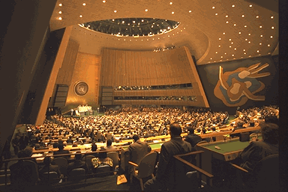The third and final Preparatory Committee (PrepCom) for the 2015 Review Conference of the Treaty on the Non-Proliferation of Nuclear Weapons (NPT) will open at United Nations headquarters on 28 April. This page explains the format of the PrepCom and its main objectives.
 The Chairman of the 2014 NPT PrepCom is Ambassador Enrique Román-Morey of Peru. Tariq Rauf, Director of SIPRI’s Disarmament, Arms Control and Non-Proliferation Programme, is acting as Ambassador Román-Morey's Senior Advisor. Rauf was Alternate Head of the International Atomic Energy Agency (IAEA) NPT delegation from 2002 to 2010, and a member of Canada’s NPT delegation from 1987 to 2000.
The Chairman of the 2014 NPT PrepCom is Ambassador Enrique Román-Morey of Peru. Tariq Rauf, Director of SIPRI’s Disarmament, Arms Control and Non-Proliferation Programme, is acting as Ambassador Román-Morey's Senior Advisor. Rauf was Alternate Head of the International Atomic Energy Agency (IAEA) NPT delegation from 2002 to 2010, and a member of Canada’s NPT delegation from 1987 to 2000.
About the NPT
The NPT, which opened for signature in 1968 and entered into force in 1970, is widely accepted as the world’s most successful and the most widely adhered to multilaterally negotiated international arms control agreement. All states in the world—except for India, Israel, North Korea, Pakistan and South Sudan—are parties to the NPT. This treaty is the cornerstone of the post-World War II nuclear disarmament and non-proliferation regime, and facilitates cooperation in the peaceful uses of nuclear energy. Since its entry into force, review conferences have been held every five years to assess the implementation of the Treaty. Preparatory Committee sessions are held in each of three years preceding the quinquennial review conference—the next will be held in 2015.
The NPT was extended in force indefinitely 1995 through an interrelated package of three decisions and a resolution on the Middle East nuclear-weapon-free zone (NWFZ). In 2000, the review conference agreed on a number of practical steps to achieve nuclear disarmament and to strengthen non-proliferation. At the 2010 review conference, 64 actions were adopted to strengthen the implementation of the NPT across its three pillars—nuclear non-proliferation, nuclear disarmament and peaceful uses of nuclear energy—as well as on the establishment of NWFZ in the Middle East.
About the PrepCom meetings
In Decision I on Strengthening the Review Process for the Treaty, adopted at the 1995 NPT Review and Extension Conference, states parties decided that the ‘purpose of the Preparatory Committee meetings would be to consider principles, objectives and ways in order to promote the full implementation of the Treaty, as well as its universality, and to make recommendations thereon to the Review Conference’ and that these ‘meetings should also make the procedural preparations for the next Review Conference’.
Furthermore, at the 2000 NPT Review Conference, states parties adopted the Final Document which inter alia included ‘Improving the effectiveness of the strengthened review process for the Treaty’, that stipulates that at its third and, as appropriate, fourth sessions, the PrepCom, taking into account the deliberations and results of its previous sessions, should make every effort to produce a consensus report containing recommendations to the Review Conference.
The 2014 NPT PrepCom
The PrepCom will have up to 20 meetings over ten working days and the detailed work on substance is reflected in the programme of work. The substantive content is the same as for the previous session, but it allocates more time to completing the preparations for the Review Conference. The 2010 Action Plan, a collective undertaking by all states parties, provides the framework to reflect upon what has been achieved and what still remains to be done to fully implement the Action Plan.
The first four meetings will be devoted to procedural matters of the PrepCom and the Review Conference, as well as the General Debate. This will be followed by one session devoted to civil society presentations. There will be one meeting on each of the three clusters, followed by one meeting for each of the specific issues to be discussed under each cluster. In keeping with the agreement reached at the first session of the PrepCom, the three clusters of issues to be considered are:
- Cluster 1: implementation of the provision of the Treaty relating to non-proliferation of nuclear weapons, disarmament and international peace and security; as well as security assurances;
- Cluster 2: implementation of the provision of the Treaty relating to Non-Proliferation of nuclear weapons, safeguards and nuclear-weapon-free zones; and
- Cluster 3: implementation of the provision of the Treaty relating to the inalienable right of all parties to the Treaty to develop research, production and use of nuclear energy for peaceful purposes; as well as (e) other provisions of the Treaty.
Similarly, specific issues to be considered by the PrepCom will include nuclear disarmament and security assurances (Cluster 1); regional issues, including with respect to the Middle East and the implementation of the 1995 Middle East resolution on a NWFZ (Cluster 2); and peaceful uses of nuclear energy and other provisions of the Treaty, as well as improving the effectiveness of the strengthened review process (Cluster 3).
Looking ahead to the 2015 NPT Review Conference
The second week of the PrepCom will deal with the organization of the 2015 Review Conference and the preparatory work for the review and operation of the Treaty, followed by the consideration of the draft report of the PrepCom and the recommendations to the Review Conference with a view to adoption by consensus.
During the third session of the PrepCom, states parties also will have to agree on the Draft Agenda for the Review Conference and allocate items to the Main Committees, which should follow the model in 2010; recommend the draft rules of procedure for the Review Conference; take note of the revised cost estimates provided by the Secretariat on the financing of the 2015 Review Conference, including its Preparatory Committee; agree on the schedule for the division of costs; and take note of the appointment of the Secretary-General of the Review Conference.